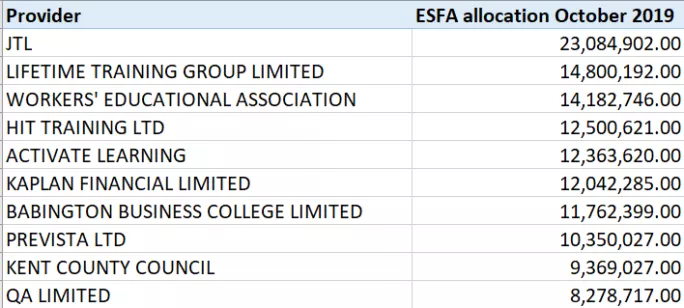- Home
- Training providers lose millions through devolution
Training providers lose millions through devolution

The largest training providers have lost millions in direct Education and Skills Funding Agency (ESFA) income, as a consequence of the government’s skills devolution, new figures have shown.
The funding values for colleges, training organisations and employers with an adult education budget (AEB), apprenticeship, advanced learner loan or traineeship contract for 2019-20, published on 31 October, show that the largest 10 independent learning providers in terms of their allocations have received more than £53 million less than the biggest 10 providers received from the ESFA in autumn 2018.
Background: £630m in adult education funds handed to mayors
News: Adult education: 6 ways to improve skills devolution
Opinion: ‘Adult education devolution is creating a postcode lottery’
Skills devolution
It is believed that this is due to the devolution of the skills budget, which has benefited smaller, regional providers over national ones. In March 2019, £630m of the AEB was passed to seven mayoral areas across England, as part of the first wave of skills devolution.
On Monday, mayor of the West Midlands, Andy Street, told the Association of Colleges’ Annual Conference that the number of providers in the region receiving skills funding had dropped from 400 to 50 following the devolution of the skills budget.
Among the largest recipients nationally, both in the October 2019 and September 2018 data, was the Workers’ Educational Association (WEA). However, the amount dropped by more than a quarter in a single year - from just over £19m in 2018 to about £14m in 2019.
Jo Cain, deputy chief executive of the WEA, said 28 per cent of the core funding it received from government had been devolved to some of the metropolitan combined authorities.
“We secured devolved funding from all but one of the mayoral combined authorities and the ESFA continues to support us in all non-devolution areas.
“We highlighted previously that the transition from national funding to devolved funding was going to have consequences for some national providers like ourselves, and this had an impact on our existing local provision.
“However, we are pleased to be working with the combined authorities and the ESFA to deliver high-quality provision for communities, and are continuing to develop both our provision and processes to ensure we continue to be flexible and are able to adapt to deliver local skills priorities going forward.”
JTL, a provider offering advanced apprenticeships in electrical and plumbing, engineering maintenance, and heating and ventilating made the top of the list both this year and last year with the largest allocations from the ESFA - but that also dropped by £2m to about £23m.
Other providers, including construction training provider CITB and Babcock Training, dropped out of the top 10 altogether.
Mark Dawe, chief executive of the Association of Employment and Learning Providers, said it had been “a challenging year for ITPs”, but a “transitional one”.
“We believe that the direction of travel taken by the policymakers is broadly correct. The devolved tenders for the AEB have resulted in allocations being reduced, but if the combined authorities procure more of their share of the budget in the future, we could see good-performing providers rewarded. In fact, for all programmes, the policy changes should see well-managed providers benefit and allow them to build their business,” he added.
Mr Dawe added that the limited apprenticeship funding available for non-levy employers had been “a hindrance to growth and of course those providers without an ESFA non-levy contract have had a particularly trying time”.
“Nevertheless, if the next stage of the apprenticeship reforms goes well with additional funding to the levy to back it up, then the medium-term outlook looks more healthy,” he added.
“In the meantime, the resilience and flexibility of independent providers in their service of employers and learners is remarkably impressive given that high quality has to be maintained in the face of increasing costs.”

Keep reading for just £1 per month
You've reached your limit of free articles this month. Subscribe for £1 per month for three months and get:
- Unlimited access to all Tes magazine content
- Exclusive subscriber-only stories
- Award-winning email newsletters



